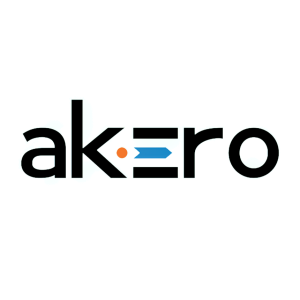Akero Therapeutics Reports Encouraging 36-Week Analysis of 96-Week Phase 2b SYMMETRY Study, with a Trend on Fibrosis Improvement and Statistically Significant Results for NASH Resolution, Markers of Liver Injury and Fibrosis, Insulin Sensitization and Lipoproteins
Investor webcast at 8:00 a.m. ET to further discuss data
SOUTH SAN FRANCISCO, Oct. 10, 2023 (GLOBE NEWSWIRE) -- Akero Therapeutics, Inc. (Nasdaq: AKRO), a clinical-stage company developing transformational treatments for patients with serious metabolic disease marked by high unmet medical need, today reported a 36-week analysis of SYMMETRY, a 96-week Phase 2b study evaluating the efficacy and safety of its lead product candidate efruxifermin (EFX) in patients with compensated cirrhosis (F4) due to nonalcoholic steatohepatitis (NASH).
A trend was observed for the primary endpoint of fibrosis improvement at 36 weeks, with
“Although no head-to-head comparative studies have been conducted, and despite the short treatment with EFX, the week 36 SYMMETRY results are the strongest data set reported to date in a placebo-controlled trial in the difficult-to-treat population of patients with cirrhosis due to NASH,” said Stephen Harrison, M.D., founder and chairman of Pinnacle Clinical Research and Akero’s SYMMETRY study’s principal investigator. “Patients with cirrhosis have high levels of hepatic collagen and this takes time to resorb even though synthesis of collagen was rapidly and substantially reduced by EFX. I’m encouraged that statistically significant improvements on multiple measures of NASH pathogenesis were observed in EFX-treated patients. EFX shows promise for stabilizing and improving liver health for patients with cirrhosis, and I look forward to seeing the final SYMMETRY study results.”
Patients with cirrhosis due to NASH face a poor prognosis. Unless they receive a transplant, only half survive beyond 5 years. This is due to a greatly depleted population of normally functioning liver cells leaving the liver with much less capacity to perform its many functions, vital for patient health. Not only are the odds of survival poor, but as cirrhosis progresses to decompensation, and end-stage disease, patient quality of life is severely compromised. This underlines the high unmet medical need to at least arrest progression or preferably reverse cirrhosis due to NASH.
“We believe this analysis of the SYMMETRY study contributes to a growing body of evidence for EFX’s potential to benefit patients with NASH who are either cirrhotic or pre-cirrhotic.,” said Andrew Cheng, M.D., Ph.D., president and chief executive officer of Akero. “We set a high bar with the primary endpoint after only 36 weeks of treatment. Viewing these data in their totality, including a fibrosis improvement trend, reports of regression from cirrhosis to stage two fibrosis, statistically significant rates of NASH resolution, and statistically significant and sustained reductions in markers of liver injury and fibrosis after 36 weeks, we believe EFX has the potential to show additional improvements for patients after the long-term follow-up period is complete at Week 96.”
Summary of Week 36 Biopsy Endpoints1
| Measure (Mean) | Placebo (N=57) | 28mg (N= 46) | 50mg (N= 50) |
| Improvement in at least one stage of fibrosis without worsening NASH (%) | 14 | 22 | 24 |
| Placebo (N=46) | 28mg (N= 38) | 50mg (N= 42) | |
| Resolution of NASH (%) | 26 | 63 ** | 60 ** |
| NASH resolution AND improvement of at least one stage of fibrosis (%) | 9 | 21 | 14 |
1 Consensus read
Source Data: Liver Biopsy Analysis Set (fibrosis improvement); Liver Biopsy Analysis Set (definitive NASH only) (resolution of NASH and combined endpoint)
** p<0.01, versus placebo (Cochran–Mantel–Haenszel test)
Summary of Week 36 Changes in Non-invasive Markers of Fibrosis and Liver Injury
| Measure (LS Mean Change From Baseline to Week 36) | Placebo (N=58) | 28mg (N= 46-47) | 50mg (N= 50-51) |
| Pro-C3 (µg/L) (2nd Generation ELISA) | -16 | -59 *** | -49 *** |
| ELF Score | +0.1 | -0.2 * | -0.3 *** |
| Liver Stiffness (kPa) (FibroScan) | -4.3 †† | -3.6 † | -3.8 †† |
| ALT (U/L) | -4.9 | -12.7 ** | -11.4 ** |
| AST (U/L) | -2.7 | -10.1 *** | -11.7 *** |
Source Data: Full Analysis Set
* p<0.05, ** p<0.01, *** p<0.001, versus placebo (Mixed Model Repeated Measures [MMRM])
† p<0.05, †† p<0.01, versus baseline (MMRM)
Summary of Week 36 Changes in Serum Markers of Glucose and Lipid Metabolism
| Measure (LS Mean Change From Baseline to Week 36) | Placebo (N=58-59) | 28mg (N= 46-47) | 50mg (N= 50) |
| HbA1c (%, absolute) | -0.1 | -0.4 †† | -0.2 |
| C-Peptide (%) | -10 | -22 * | -26 ** |
| Adiponectin (%) | +9 | +114 *** | +92 *** |
| Triglycerides (%) | -5 | -23 *** | -29 *** |
| Non-HDL Cholesterol (%) | -3 | -10 ††† | -15 ** |
| LDL Cholesterol (%) | -1 | -5 | -10 ††† |
| HDL Cholesterol (%) | +1 | +21 *** | +24 *** |
| Body Weight (kg) | -0.8 | -0.8 | -1.4 † |
Source Data: Full Analysis Set
* p<0.05, ** p<0.01, *** p<0.001, versus placebo (MMRM)
† p<0.05, †† p<0.01, ††† p<0.001, versus baseline (MMRM)
EFX was reported to be generally well-tolerated. Across all three groups, there was one death in a placebo patient who had pneumonia. Twenty-one serious adverse events were reported, which were generally balanced across dose groups. None of these were reported as treatment-related by the clinical investigators. A total of 12 patients were discontinued due to adverse events determined by the investigator to be drug-related, one in the placebo group, three in the 28mg group and eight in the 50mg group. The majority of these discontinuations were due to grade 1-2 diarrhea, which accounted for five patients due to diarrhea in the 50mg group. Overall, the most frequent adverse events were transient, mild-to-moderate gastro-intestinal grade 1 or 2 events.
Conference Call / Webcast Details
The company will host a conference call and webcast with slide presentation at 8:00 a.m. ET. Please click here to register for the event. The live webcast will be available on the Events & Presentations page of the Akero website, with the recording and presentation available following the event.
About NASH
NASH is a serious form of non-alcoholic fatty liver disease (NAFLD) that is estimated to affect 17 million Americans. NASH is characterized by an excessive accumulation of fat in the liver that causes stress and injury to liver cells, leading to inflammation and fibrosis, which can progress to cirrhosis, liver failure, cancer and eventually death. Approximately
About SYMMETRY
The Phase 2b SYMMETRY main study is a multicenter, randomized, double-blind, placebo-controlled, clinical trial in biopsy-confirmed NASH patients with compensated cirrhosis (F4, Child-Pugh class A). One hundred eighty-two patients have been randomized to receive once-weekly subcutaneous dosing of 28mg EFX, 50mg EFX, or placebo. The primary endpoint for the trial was the proportion of subjects who achieve ≥ 1 stage improvement in fibrosis with no worsening of NASH at week 36. Secondary endpoints include the proportion of patients who achieve NASH resolution with no worsening of fibrosis, the proportion of patients who achieve ≥ 1 stage improvement in fibrosis and NASH resolution, change from baseline to week 36 in non-invasive markers of liver injury and fibrosis, glycemic control, lipoproteins, and body weight, as well as evaluation of safety and tolerability. Patients are continuing to receive EFX or placebo for up to 96 weeks.
About Efruxifermin
Efruxifermin is Akero’s lead product candidate for NASH, currently being evaluated in the ongoing Phase 2b HARMONY and SYMMETRY studies. EFX is designed to reduce liver fat and inflammation, reverse fibrosis, increase insulin sensitivity and improve lipids. This holistic approach offers the potential to address the complex, multi-system disease state of NASH, including improvements in lipoprotein risk factors linked to cardiovascular disease – the leading cause of death in NASH patients. Engineered to mimic the biological activity profile of native FGF21, EFX is designed to offer convenient once-weekly dosing and has been generally well-tolerated in clinical trials to date.
About Akero Therapeutics
Akero Therapeutics is a clinical-stage company developing transformational treatments for patients with serious metabolic diseases marked by high unmet medical need, including NASH, a disease without any approved therapies. Akero's lead product candidate, EFX, is a differentiated Fc-FGF21 fusion protein that has been engineered to mimic the balanced biological activity profile of native FGF21, an endogenous hormone that alleviates cellular stress and regulates metabolism throughout the body. EFX is designed to offer convenient once-weekly subcutaneous dosing. EFX is currently being evaluated in two Phase 2b clinical trials: the HARMONY study in patients with pre-cirrhotic NASH (F2-F3 fibrosis), and the SYMMETRY study in patients with cirrhotic NASH (F4 fibrosis, compensated). Akero is headquartered in South San Francisco. Visit us at akerotx.com and follow us on LinkedIn and Twitter for more information.
Forward Looking Statements
Statements contained in this press release regarding matters that are not historical facts are "forward-looking statements'' within the meaning of the Private Securities Litigation Reform Act of 1995. Because such statements are subject to risks and uncertainties, actual results may differ materially from those expressed or implied by such forward-looking statements, including, but not limited to, statements regarding Akero’s business plans and objectives, including future plans or expectations for EFX, the therapeutic effects of EFX, as well as the dosing, safety and tolerability of EFX; the timing and completion of enrollment of Akero’s Phase 3 SYNCHRONY program by end of this year; and upcoming milestones, including the results, and expected timing to report the long-term follow-up week 96 results of Akero’s Phase 2b SYMMETRY study. Any forward-looking statements in this press release are based on management's current expectations of future events and are subject to a number of risks and uncertainties that could cause actual results to differ materially and adversely from those set forth in or implied by such forward-looking statements. Risks that contribute to the uncertain nature of the forward-looking statements include: the success, cost, and timing of Akero’s product candidate development activities and planned clinical trials; Akero’s ability to execute on its strategy; positive results from any of its clinical studies may not necessarily be predictive of the results of future or ongoing clinical studies; regulatory developments in the United States and foreign countries; Akero’s ability to fund operations; as well as those risks and uncertainties set forth more fully under the caption "Risk Factors'' in Akero’s most recent Annual Report on Form 10-K and Quarterly Report on Form 10-Q, as filed with the Securities and Exchange Commission (SEC) as well as discussions of potential risks, uncertainties and other important factors in Akero’s other filings and reports with the SEC. All forward-looking statements contained in this press release speak only as of the date on which they were made. Akero undertakes no obligation to update such statements to reflect events that occur or circumstances that exist after the date on which they were made.
Investor Contact:
Austin Murtagh
212.698.8696
IR@akerotx.com
Media Contact:
Sarah O’Connell
732.456.0092
soconnell@vergescientific.com









